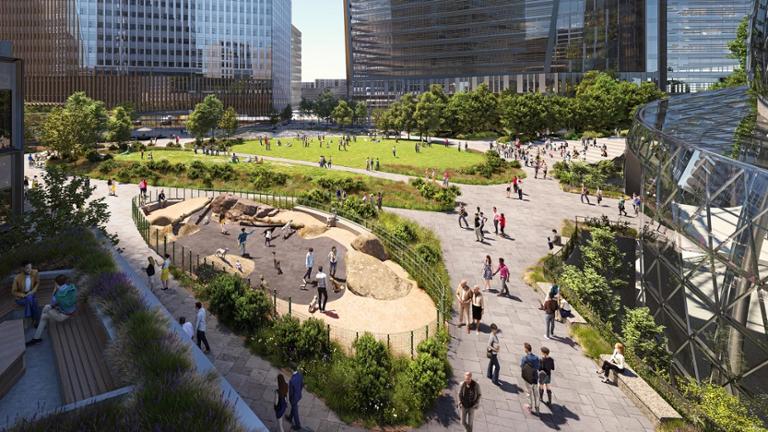
It’s the weekend! Before you shut down for the next few days (you are taking a bit of time to relax, no?), let’s touch on some of the week’s biggest tech stories that you might have missed, including Amazon’s HQ2 update, a cool use of machine learning to make video games look really good, and Apple’s latest maneuver to convince you that all its App Store policies are for your own good.
Amazon Hiring for HQ2 Picks Up
After a whole lot of drama, it seems that Amazon’s second headquarters—dubbed HQ2—is taking its final form. In a new corporate blog posting, the e-commerce giant announced it plans on hiring an additional 1,900 employees for the giant facility in Arlington, Virginia, right across the river from Washington, D.C.
“We remain committed to creating 25,000 jobs and investing $2.5 billion in Arlington over the next decade,” the blog posting added. The second phase of HQ2’s construction will focus on “open and active spaces” and a blend of “architectural and ecological elements.” Those open spaces will include 2.5 acres for public use, with an amphitheater and a “forest grove.”
Amazon originally intended to build two headquarters facilities, one in New York City and the other in Northern Virginia. However, politicians and citizens in New York City protested those plans hard enough to deter the company.
Virginia proved far more welcoming, especially given the substantial presence of AWS datacenters in the northern part of the state. Virginia’s state government also offered Amazon fewer tax incentives than some other states ($750 million, versus the billions that states such as New Jersey were prepared to offer) but emphasized the quality of the local workforce, which won the company over. “It’s not just monetary incentives, but it’s looking at the comprehensive environment to allow companies to flourish,” Brian Huseman, Amazon’s vice president for public policy, told CNBC at the time.
As Amazon hires for HQ2, it’ll need to pay a premium for talent. According to the most recent Dice Salary Report, the average technologist salary in Virginia hit $105,121 in 2020, just behind New York ($109,921) and California ($111,228).
Intel Uses Machine Learning to Improve ‘Grand Theft Auto’
If video games become even more photorealistic over the next several years, you might have to thank machine learning and neural networks. Intel Labs is showing off a new project, “Enhancing Photorealism Enhancement” (say that five times fast), that can take a virtual environment and render it virtually life-like. (Hat tip to The Verge for posting about the project; you can find the whitepaper about it online.)
The net result of all this work is imagery that looks smoother and more reflective—just check out “Grand Theft Auto V” (already a good-looking game) after a machine-learning facelift:
This is just a hint of how machine learning and neural networks could impact gaming in the years ahead. Imagine applying a version of this technology to updating older games, or virtual reality (VR).
Apple Claims It Stopped $1.5 Billion in Fraudulent Transactions
Apple is a pretty secretive company, dribbling out information about its internal processes only when it serves a particular need, so it’s interesting that the company is pulling the curtain back on its App Store policies for detecting fraud.
In a new blog posting, the company claims that it managed to block $1.5 billion in fraudulent App Store transactions in 2020, in addition to rejecting 1 million “problematic” new apps and almost 1 million app updates.
Apple also claims that it eliminates “bad apps” on storefronts beyond the App Store. “Over the last 12 months, Apple found and blocked nearly 110,000 illegitimate apps on pirate storefronts,” the blog posting added. “These storefronts distribute malicious software often designed to resemble popular apps — or that modify popular apps without their developers’ authorization — while circumventing the App Store’s security protections.”
Why is Apple offering up all this information now? The company’s courtroom brawl with Epic, the creator of the blockbuster “Fortnite” game, might have something to do with it. Epic is insisting that the App Store is an unfair monopoly, and that Apple’s 30 percent commission on app sales is essentially an “Apple tax.” If that wasn’t enough to give Apple CEO Tim Cook a bit of heartburn in the morning, the U.S. Senate has also conducted hearings into Apple’s app-store practices.
Given that pressure, Apple needs to show that it performs valuable services in exchange for that commission, and that its policies are protective as opposed to heavy-handed. Can it win this PR war? Nothing less than a very hefty chunk of its future revenue depends on it.
That’s it, everyone! Have a great weekend!